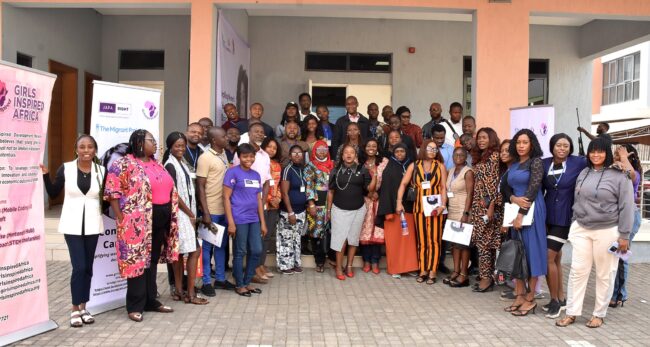Nigeria’s Federal Government, in collaboration with the International Organisation for Migration (IOM), has evacuated a total of thirty-four thousand, six hundred and ninety-four stranded Nigerian migrants from different parts of the world.
The evacuees, comprising 19,579 males and 15,115 females, according to the Awareness Raising Programme Officer of IOM, Cyprine Cheptepkeny, were returnees from Chad, Libya, Morocco, Mali, Ghana, Germany, and the Netherlands, among others.
Cheptepkeny gave the statistics during a one-day media training for selected journalists in Lagos.
The workshop, themed “Strengthening women’s voices in migration decision-making,” was organised by Girls Inspired Africa in conjunction with The Migrant Project and Connect Her.
Speaking on “The role of the media in amplifying women’s migration decision-making: a panacea to strengthen women’s agency,” she noted that the media plays a critical role in framing the migration narrative while also advising media practitioners to uphold ethical journalism, ensure stigma-free language, and promote balanced and inclusive news coverage.
Cheptepkeny disclosed that reintegration was a core activity of IOM Nigeria while noting that 28,204 survivors, comprising 16, 264 males and 11, 940 females, were reintegrated from 2017 to date.
She said, “The returnees received in-kind reintegration assistance, including vocational education and training to help them start an income-generating activity of their choice.
“The dynamics of the migration pattern had shifted, as data had shown an increased number of women migrating in the last few years.”
Similarly, Head, Migration Resource Centre (MRC), Lagos, and Deputy Director, Federal Ministry of Labour and Employment, Mrs Maureen Ovie, revealed that 45 percent of women travel independently.
The current trend, according to her, indicates an increase in the statistics while noting that many women have unrealistic expectations and lack proper information on the migration process and procedures, thereby exposing themselves to exploitation.
Speaking on the roles of government, she said the government plays a critical role in increasing awareness of regular migration, counselling, and training to boost employability and create a gender-responsive environment.
According to her, the Federal Government will ensure fair recruitment practices and monitoring of private recruitment agencies, adding that recent findings showed that quacks hide under recruitment to engage in human trafficking.
Head of Migration (Southwest), National Commission for Refugees, Migrants, and Internally Displaced Persons (NCFRMI), Ms. Ijeoma Ifeobu, said the federal government was working assiduously to ensure the right messages were promoted to reduce irregular migration.
Earlier, the Executive Director, Girls Inspired Development Network (GIDN), Mrs. Rita Folawewo, while speaking on the objective of the workshop, said it seeks to enhance the capabilities of journalists in Lagos in amplifying women’s voices in migration decision-making processes.
“The training addresses challenges faced by the media in strengthening the discourse, highlighting resources, tools, and opportunities for the media, and improving documentation of women’s stories for justice and human rights,” she said.
